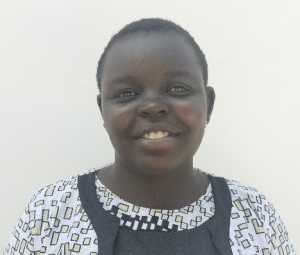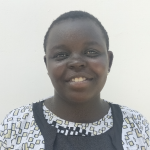With 922 students and 21 staff members at Ebubole Primary School, there are a lot of mouths to keep hydrated and a lot of hands and classrooms to clean. But, unfortunately, with the way things stand there right now, neither of those objectives is being fulfilled.
On school grounds, there are an unprotected, shallow hand-dug well and an untreated 10,000-liter rain tank. Given the high number of typhoid cases among both students and staff members, it's likely that both of these sources are contaminated.

"The well is located in front of [a] classroom near trees which [sheds] leaves, causing contamination, especially when [the leaves] decompose around the well," explained our field officer, Laodia. "[The] rainwater harvesting tank located behind the classrooms is not always cleaned, which leads to [an] accumulation of dirt and solid matter at the base [of the tank], which, with time, leads to [the] water not being safe for consumption."
"We have had many cases of typhoid since the well is not well protected," said senior teacher Benson Wagara (shown below).

"When I first felt sick in 2014, I thought it was just the normal malaria, but it turned out to be [a] bacterial infection which was caused by contaminated water from the school," Benson continued. "After treatment, all was well until the year 2021 when the same condition occurred, which prompted me to [get] a test on typhoid, of which the results from the laboratory showed positive. Ever since that time, I have resorted to boiling drinking water and [carrying] my own [water] from home everywhere I go to prevent any other health problems."
“Better water sources...mean less expenditure on health, as people are less likely to fall ill and incur medical costs, and are better able to remain economically productive. With children particularly at risk from water-related diseases, access to improved sources of water can result in better health and therefore better school attendance, with longer-term consequences for their lives.” - WHO Africa
Aside from being contaminated, both of the school's current water sources are seasonal, which means that during Kenya's lengthening dry seasons, students have no reliable source of water. During that time, students are tasked with carrying water from home.

"As a student, sometimes [I] am forced to [wake] up very early in the morning to fetch water from home, especially during [the] dry season," said 10-year-old Sandra B (pictured above). "In the month of July this year, we had no water at our school, and it really made our class work very difficult because we could carry a jerrycan of water [in] one hand and books [in] the other, which made me so tired and exhausted. [I had] less concentration, which led to [the] dropping of [my] grades."
An improved source of reliable water will keep the students clean and hydrated all year 'round and reserve their energy for learning rather than fetching water.
What We Can Do:
New Well
We conducted a hydrogeological survey at this school, and the results indicated the water table beneath it is an ideal candidate for a borehole well. Due to a borehole well's unique ability to tap into a safe, year-round water column, it will be poised to serve all of the water needs for this school's large population, even through the dry season.
The school will help collect the needed construction materials such as sand, rocks, and water for mixing cement. They will also provide housing and meals for the work team, in addition to providing local laborers. We will complement their materials by providing an expert team of artisans and drilling professionals, tools, hardware, and hand-pump. Once finished, the school’s students and staff will use water from the well for drinking, handwashing, cooking, cleaning, and much more.
The school and we strongly believe that all of these components will work together to improve standards at this school, which will help lead to better student academic performance and unlock the opportunity for these students to live better, healthier lives.
Handwashing Stations
The student health club will oversee two new handwashing stations we will provide and ensure they are kept clean and in working condition. The club leaders will fill the handwashing stations with water daily and make sure they are always supplied with a cleaning agent such as soap or ash.
VIP Latrines
Two triple-door latrine blocks will be constructed with local materials that the school will help gather. Three doors will serve the girls, and three doors will serve the boys. These new latrines will have cement floors designed to be easy to use and clean. And with a new well right on school property, there should be enough water to keep them clean.
Training on Health, Hygiene, and More
We will hold a one-day intensive training session with students, teachers, and parents. This training will cover a wide range of topics, including disease transmission routes and prevention; personal and environmental hygiene; and the operation and maintenance of the borehole, latrines, and handwashing stations. There will be a special emphasis on handwashing.
Our team of facilitators will use various methods to train, including participatory hygiene and sanitation transformation and asset-based community development. We will initiate a student health club, which will prepare students to lead other pupils into healthy habits at school and home. We will also lead lectures, group discussions and provide illustrative handouts to teach health topics and promote good hygiene practices within the school, including handwashing and water treatment. We will then conduct a series of follow-up training before transitioning to our regularly scheduled support visits throughout the year.
We and the school strongly believe that all of these components will work together to improve standards at this school, which will help lead to better student academic performance and will help unlock the opportunity for these students to live better, healthier lives.





 Borehole Well and Hand Pump
Borehole Well and Hand Pump
 Rehabilitation Project
Rehabilitation Project





















 We set up two handwashing stations outside the latrines and handed them over to the newly formed student health club. Health club members will teach other students how to wash their hands at the stations properly, fill the stations with water, and ensure that there is always a cleaning agent available.
We set up two handwashing stations outside the latrines and handed them over to the newly formed student health club. Health club members will teach other students how to wash their hands at the stations properly, fill the stations with water, and ensure that there is always a cleaning agent available.












